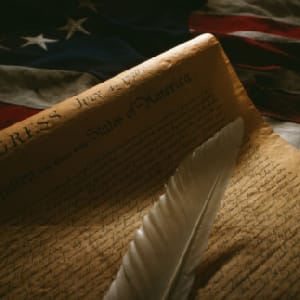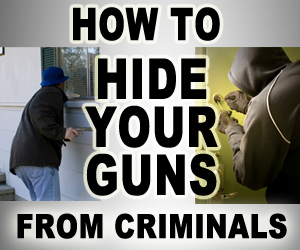By Dave Workman
Seattle Gun Rights Examiner
Monday’s big win for gun rights in Maryland – courtesy a lawsuit filed by the Bellevue-based Second Amendment Foundation on behalf of Maryland resident Raymond Woollard – is already being demonized by anti-gunners, and will likely be appealed by the State Attorney General.
The case is Woollard v. Sheridan.
It was admittedly a big win for SAF, which has in the neighborhood of 20-plus cases in progress challenging onerous gun laws on constitutional grounds. SAF founder and Executive Vice President Alan Gottlieb coined a slogan about two years ago that seems appropriate: “Winning Firearms Freedom One Lawsuit at a Time.”
Reaction to Monday’s victory has been mostly positive. For more information on SAF, or to make a contribution to its legal fund, click here. (Contributions to SAF are tax-deductible.)
But state Assistant Attorney General Matthew Fader vowed to appeal the ruling.
“We disagree with this ruling,” Fader said in a written statement that noted the “very important implications of the ruling for public safety.”—Fox News
Yet, Fader’s comments were tame compared to the reaction from the Brady Center to Prevent Gun Violence. Thanks to the NRA’s always reliable Richard Wahl, who provides a daily headline roundup on gun issues, this column got an eyeful Tuesday morning of the good and bad. Since this column reported the good Monday, here’s the other side as detailed by the Washington Post:
“This is a potentially very dangerous decision. People of Maryland have right to decide who can carry loaded guns in the public places that we all enjoy.”— Jonathan Lowy, director of the Legal Action Project at the Brady Center to Prevent Gun Violence
(Actually, that may not be true at all. Civil rights are not subject to public whim or popularity contests.)
“I don’t think this is a decision that will enhance public safety. It will more likely harm public safety.”— Daniel Webster, co-director of the Johns Hopkins Center for Gun Policy and Research
(Webster’s remark smacks of the same rhetoric repeatedly used by gun prohibitionists, who predicted that concealed carry reform laws would lead to gunfights over traffic accidents and widespread gun ownership would lead to widespread violence. FBI crime data suggests quite the opposite.)
The Baltimore Sun also hooked up with Lowy, who continued to explain his organization’s opposition to the ruling, by U.S. District Judge Benson Everett Legg.
“It’s perfectly reasonable and prudent for Maryland to have law enforcement decide who has a demonstrated need to carry loaded guns in public. There’s a whole other level of risk that the public is exposed to when civilians carry loaded guns on public parks, streets, in restaurants, what have you…
“Maryland’s law is completely reasonable, and to hold that the Constitution does not allow Maryland to make that reasonable decision, we think, is not supported by the case law.”— Jonathan Lowy, director of the Legal Action Project at the Brady Center to Prevent Gun Violence
According to the Sun, Lowy believes that if Judge Legg’s ruling stands, it:
“…would be a very dangerous precedent to remain on the books. We hope and expect it to be reversed.”
On the flip side of that coin, Maryland Congressman Roscoe Bartlett, a staunch Second Amendment defender, issued a statement applauding the Legg ruling. He noted that “other local jurisdictions…restrict this Constitutional right,” so he has reintroduced the Ctizens’ Self-Defense Act, HR 2252.
“Law abiding Americans should not have to prove to governments that they have a need to own and use a gun to defend themselves and their family members.”—Congressman Roscoe Bartlett, (R-MD)
And then there is Second Amendment scholar Eugene Volokh, whose website, The Volokh Conspiracy, is considered a “must read” by legions of gun rights activists across the country. After analyzing Judge Legg’s ruling, here’s what Volokh said:
I think this result is correct — as I read Heller, it recognize a right to keep and bear arms for purpose of self-defense, and self-defense is needed wherever a person happens to be, not just in the home…Heller does approve of some historically recognized limitations on the right, such as bans on concealed carry or bans on carrying into particular “sensitive places.” But I think the logic and language of Heller suggests that the right does extend to other sorts of carrying outside the home. And while I think that talk of “intermediate scrutiny” isn’t very helpful here, the district court’s analysis in applying intermediate scrutiny seems to me to be quite right.—Eugene Volokh
The significance of Legg’s opinion might be measured in the alarmist reactions from gun prohibitionists. In the wake of the Heller and McDonald Supreme Court rulings, anti-gunners have labored to narrow the public’s perception of those decisions by insisting that the high court limited the Second Amendment right to keep and bear arms to the confines of one’s home.
Such a reading is preposterous, as a fundamental civil right that ends at the doorway of one’s home is not a right at all. The Woollard case, if it reaches the Supreme Court, would certainly help clarify the parameters of the right to bear (carry) arms as was common at the time the Amendment was written, when it was not unusual to see people traveling with all manner of arms, including dirks, daggers, sheathed hunting knives, perhaps one or two pistols, maybe a rifle or musket, possibly a fowling piece, and depending upon the location, perhaps a tomahawk or hatchet.
In short, the American public was a pretty well-armed lot when James Madison wrote the Second Amendment, and people habitually had some kind of defensive weapon close at hand when they moved about. More importantly, their neighbors did not give it a second thought, because in all likelihood, they also had some kind of gun nearby, too.
Thus, the carrying of arms could not possibly have been envisioned by Madison and the other Founders as something citizens did behind cabin or cottage doors. As Judge Legg noted:
“In addition to self-defense, the (Second Amendment) right was also understood to allow for militia membership and hunting. To secure these rights, the Second Amendment‘s protections must extend beyond the home: neither hunting nor militia training is a household activity, and ‘self-defense has to take place wherever [a] person happens to be’.”—Judge Benson E. Legg
Read Judge Legg’s opinion here.
ADVERTISEMENT




You must be logged in to post a comment Login